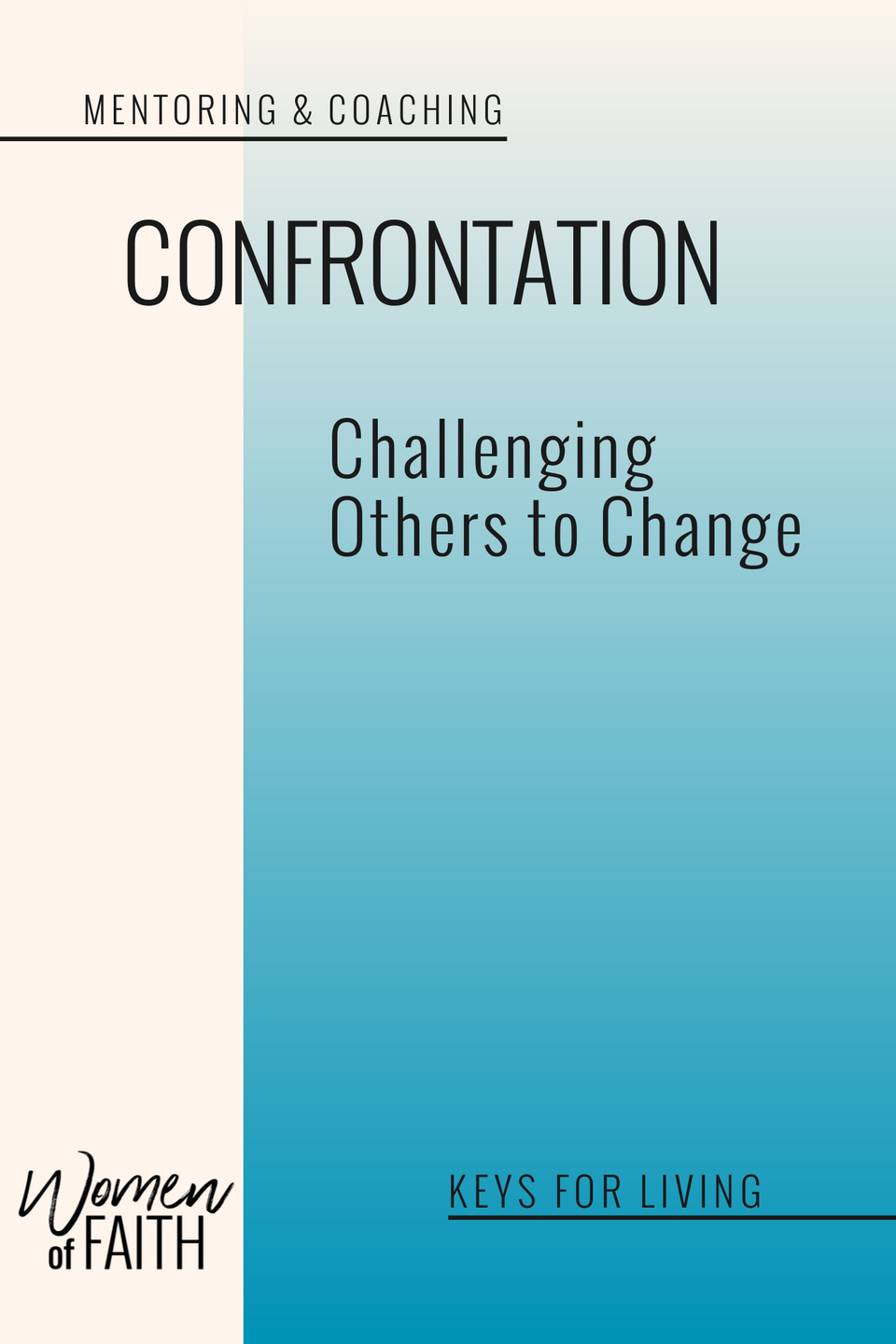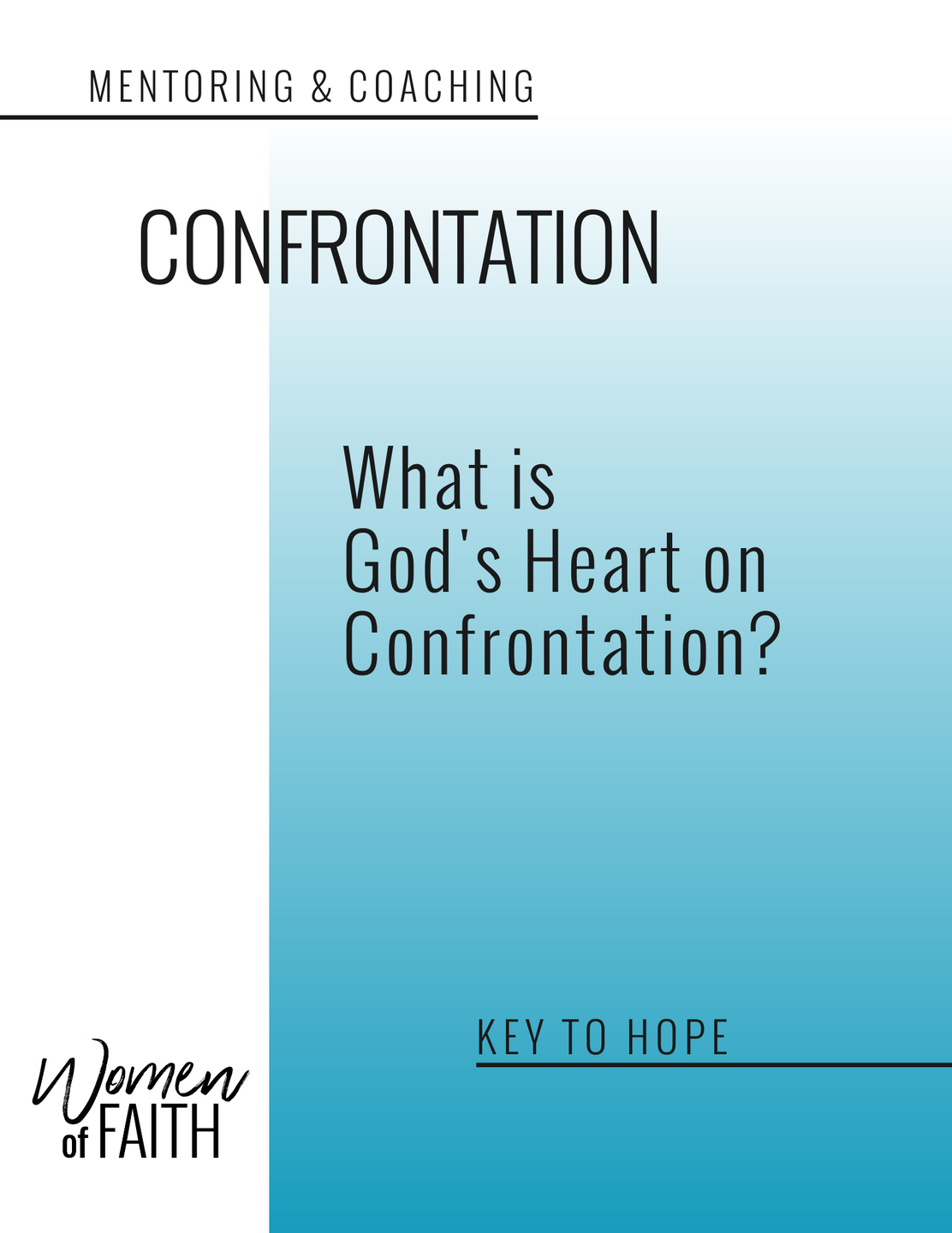CONFRONTATION

E-BOOK
Ready to start reading right now?
Download now for a complete and comprehensive reading on CONFRONTATION.
KEYS FOR LIVING BOOKS
The Women of Faith Keys for Living books are designed for those looking for help and for those looking to help, the Keys for Living were created to help you … and help you help others. The Keys are great for personal study and growth, small group studies, and for teaching and training purposes.
What to Expect in the Keys: You’ll discover God’s wisdom and guidance in a simple format.
- Definitions help you understand the topic from God’s perspective.
- Characteristics give insight into the different aspects of the topic.
- Causes shed light on the underlying issues related to the topic.
- Steps to Solution (Step-by Step) show you how to be transformed, walk in freedom and live in victory.
“Let us therefore make every effort to do what leads to peace and to mutual edification.”
Romans 14:19
Conflict is unavoidable and it doesn’t have to be unbearable. God promises that we’ll clash, but He’s also shown us how to find resolution. Maybe you’ve always seen the Bible as a rule book. Look again.
In your mind, does the word conflict spell t-r-o-u-b-l-e? Disharmony in the home, wars in the workplace, disputes in the church—each situation should lead us to the One to whom we turn for direction, strength, and courage, but does it always? These Keys for Living will help you come to understand the differences between resolution and reconciliation, and come to believe that resolution rests in confronting the wrong . . . with the right heart. Learn to identify who creates conflict and who keeps it going, as well as the what, why, and how of boundaries in conflict resolution.
The reason we all experience conflict is rooted in a system of wrong beliefs. We assume that what we want is what we need and it’s up to us to defeat those who oppose us. After all, if we don’t protect our own interests, who will?
We may feel that our significance is being threatened so we attack. We may feel our security is threatened so we avoid. This fear-based thinking causes us to respond selfishly because we make the situation about us.
4 Styles of Confrontation
- The Passive Style:
The avoider confronts indirectly by using silence or nonspecific language to communicate needs and desires. (Psalm 39:1–3)
Goal: Avoid confrontation to ensure self-protection.
Disadvantages: Produces no long-term solution and leads to bigger problems.
- The Aggressive Style: The attacker confronts by overtly attacking the character of the other person in order to gain power. (Psalm 56:2)
Goal: Gain power and control through anger or force.
Disadvantages: Produces only short-term solutions and makes enemies by hurting feelings.
- The Passive-Aggressive Style: The ambusher confronts by covertly ambushing the other person as a power play. (Psalm 64:2–4)
Goal: Avoid direct responses and accountability while “getting even”.
Disadvantages: Produces no solutions and expresses destructive anger in indirect ways.
- The Assertive Style: The activator confronts by directly affirming the truth that positive change needs to take place. (1 Samuel 24:9–10, 12)
Goal: Present the facts, correct untruths, and change behavior
Advantages: Produces effective solutions and builds long-term trust and respect.
“The Lord is my light and my salvation— whom shall I fear? The Lord is the stronghold of my life— of whom shall I be afraid?”
(Psalm 27:1)
WOMEN OF FAITH SHOW with ALITA REYNOLDS
Inspiring conversations that will encourage you to live the life you were created for.
Do you want to experience a deeper relationship with Jesus?
Do you need some encouragement that your story has a purpose?
Join Alita Reynolds, the President of Women of Faith, as she and her featured guests inspire you to live the life you were created for and equip you to walk more fully in God’s purpose for your life.
Whatever your story, your life matters, you belong, and God wants you to live victoriously. You’ll meet a wide range of guests who impact the kingdom in meaningful ways every day. Their stories will inspire you to believe that when we walk by faith, ANYTHING is possible.
Practical Tools and Resources to Go Deeper!
SPIRITUAL STRENGTH | LIFE LEADERSHIP | REAL RELATIONSHIPS

NOT SURE ON HOW TO START?
LEARN: WHAT IS GOD'S HEART ON CONFRONTATION?
Get your free Key to Hope on CONFRONTATION. The download will be sent to your email.
COLLECTION OF CLASSES
Take a deep dive into complete and comprehensive teaching.
Learn with our collection of classes found by subscribing today PLUS receive so much more.
Our Women of Faith Collection of Classes are designed to help you and those you care about deepen your relationship with Jesus and make practical changes in your life. Sign up to watch the Women of Faith Collection of Classes at LIFTABLEtv and start moving toward the FREEDOM you crave.
Whatever you’re facing, your life matters, and God wants you to live in victory. Today is a great day to begin.



